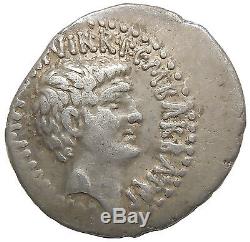Mark Antony and Octavian Augustus Denarius Ephesos Mint M. Barbatius Pollio


Triumvirs Mark Antony & Octavian Augustus. AR Denarius 21 mm , 3.7 grams Ephesos mint.
Bare head of Mark Antony right. Bare head of Octavian Augustus right. Reference : Crawford 517/2; Sear CRI 243; Sydenham 1181; RSC 8a. January 14, 83 BCAugust 1, 30 BC, known in English as Mark Antony , was a Roman. He was an important supporter and the loyal friend of Gaius Julius Caesar. As a military commander and administrator, being Caesar's second cousin, once removed, by his mother Julia Antonia. Antony formed an official political alliance with Octavian Augustus. Known to historians today as the Second Triumvirate. Broke up in 33 BC.Disagreement between Octavian and Antony erupted into civil war, the Final War of the Roman Republic. Antony was defeated by Octavian at the naval Battle of Actium. And in a brief land battle at Alexandria. He committed suicide, and his lover, Cleopatra.
23 September 63 BC 19 August AD 14. , born Gaius Octavius Thurinus , was adopted. By his great-uncle Julius Caesar. In 44 BC, and between then and 27 BC was officially named Gaius Julius Caesar Octavianus.
After 27 BC, he was named Gaius Julius Caesar Augustus. Because of the various names he bore, it is common to call him Octavius when referring to events between 63 and 44 BC, Octavian (or Octavianus) when referring to events between 44 and 27 BC, and Augustus when referring to events after 27 BC.He became the first emperor. Which he ruled alone from 27 BC until his death in AD 14. The young Octavius came into his inheritance after Caesar's assassination in 44 BC. In 43 BC, Octavian joined forces with Mark Antony. Known as the Second Triumvirate.
Octavian ruled Rome and many of its provinces as an autocrat. Seizing consular power after the deaths of the consuls Hirtius. And having himself perpetually re-elected. The triumvirate was eventually torn apart under the competing ambitions of its rulers: Lepidus was driven into exile, and Antony committed suicide following his defeat at the Battle of Actium.
By the fleet of Octavian commanded by Agrippa. After the demise of the Second Triumvirate, Octavian restored the outward facade of the Roman Republic. With governmental power vested in the Roman Senate. But in practice retained his autocratic power.It took several years to work out the exact framework by which a formally republican state could be led by a sole ruler; the result became known as the Roman Empire. The emperorship was never an office like the Roman dictatorship. Had held before him; indeed, he declined it when the Roman populace "entreated him to take on the dictatorship". By law, Augustus held a collection of powers granted to him for life by the Senate, including those of tribune. Of the plebs and censor.
His substantive power stemmed from financial success and resources gained in conquest, the building of patronage relationships throughout the Empire, the loyalty of many military soldiers and veterans, the authority of the many honors granted by the Senate, and the respect of the people. Augustus' control over the majority of Rome's legions. Established an armed threat that could be used against the Senate, allowing him to coerce the Senate's decisions. With his ability to eliminate senatorial opposition by means of arms, the Senate became docile towards his paramount position. His rule through patronage, military power, and accumulation of the offices of the defunct Republic became the model for all later imperial government.
The rule of Augustus initiated an era of relative peace known as the Pax Romana. Despite continuous frontier wars, and one year-long civil war.
Over the imperial succession, the Mediterranean world remained at peace for more than two centuries. Augustus expanded the Roman Empire, secured its boundaries with client states. And made peace with Parthia. He reformed the Roman system of taxation, developed networks of roads.System, established a standing army (and a small navy), established the Praetorian Guard. And created official police and fire-fighting forces for Rome. Much of the city was rebuilt under Augustus; and he wrote a record of his own accomplishments, known as the Res Gestae Divi Augusti. Upon his death in AD 14, Augustus was declared a god by the Senate, to be worshipped by the Romans. His names Augustus and Caesar were adopted by every subsequent emperor, and the month of Sextilis.
Was officially renamed August in his honour. He was succeeded by his stepson and son-in-law, Tiberius. Authenticity: Authenticity is unconditionally guaranteed.
The item "Mark Antony and Octavian Augustus Denarius Ephesos Mint M. Barbatius Pollio" is in sale since Monday, July 6, 2015. This item is in the category "Coins & Paper Money\Coins\ Ancient\Roman\ Imperial (27 BC-476 AD)". The seller is "galeria2" and is located in New Port Richey, Florida. This item can be shipped worldwide.
- Composition: Silver
- Ruler: Augustus

